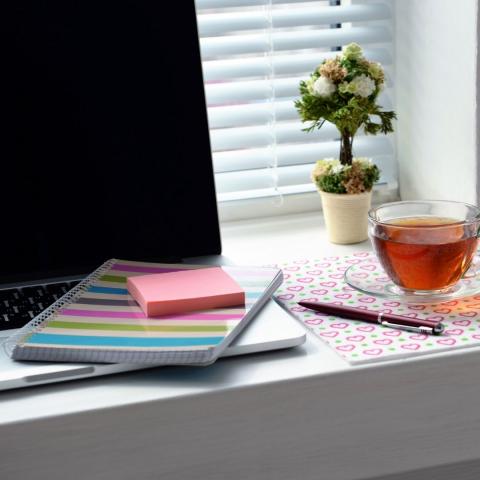
My writing space is a deeply personal realm. I enter it to make art; and while I can technically write anywhere, my home base for writing is a sanctuary for my creativity.
Do you think of your home writing space this way—as a sanctuary? I have been creating one in every home I’ve lived in since I was a child. In fact, this practice of setting up a desk, organizing books on shelves, and collecting inspiring objects helped me name myself a writer when I was an adolescent penning my first poems and short stories. Back then, I had a corner desk, one of those white particleboard pieces you buy at a box store and assemble at home. It held my stereo, my pet goldfish, and because I didn’t have a computer back then, my journals.
Today, my desk is positioned against a window, so my view is trees. If nature matters to you, is a source of your inspiration, then taking advantage of your window view is a good option. When I haven’t had a window, I’ve hung a painting, poster, or print of a natural setting that makes me happy when I look at it, and adorned my bulletin board and wall spaces with paper ephemera that inspires me. Very DIY.
In fact, my desk isn’t actually a desk—it’s a broad slab of hickory set across two short metal filing cabinets. This setup provides me with a large surface area on which to spread books, notebooks, my laptop, and anything else I need to write whatever it is I’m writing. You might not need a large surface area, but if I don’t have one, I’m usually balancing books in precarious towers on the floor or my lap. Back in my childhood writing space, that corner desk wasn’t enough. Beside it, I placed a TV tray with a pretty tapestry draped over it.
My bookshelves are a source of pride for me. I’ve been collecting books since those corner-desk days, lugging box after box of them around the country with me as I moved for college, graduate school, this job or that. I never brought the shelves when I moved, just purchased more cheap ones or procured sturdy but secondhand pieces from thrift stores or neighbors. But when I bought my first home, I splurged on nice shelving to display my books, some of my most treasured possessions.
Your ideal writing space might look very different than mine. And it might not even be “ideal,” only workable. Some of us might be sharing space or devices with others. Maybe you only have a corner of your dining room table for writing…but you can work with that. You can make it your own, if only for the time you are actually writing. And making it your own matters a great deal.
I firmly believe that the self-expressive comfort of my desk, bookshelves, and bulletin board is directly related to my productivity and the quality of my writing. I optimized my space just for writing by making three “rules” for it:
Make it clean.
I would never get any writing done if my work space was dirty; therefore, it never is. Like an altar or sacred space, I take care to wipe up my desk’s coffee rings, put loose paper in its place, empty the waste bin and recycling, and dust once in a while. Tidying up can refer to your digital spaces as well. Purge your spam box, label and organize your inbox, and consider writing from a computer that isn’t connected to the internet to minimize distraction. De-clutter, because clutter affects us on a visceral level, making it difficult to concentrate and taking up valuable space. Get organized with baskets and desktop shelving so that everything has its place. Make a ritual of straightening and readying your writing space—lighting the same scented candle, sweeping junk into the bin, and so on—before you get to work.
Make it comfortable.
Pick the right chair, or use a sit-to-stand so you are never in one position for too long. Keep a soft throw blanket and a tabletop fan nearby to keep you warm or cool enough. Have a space to put a beverage within reach, but not where a spill would be catastrophic. Keep your favorite books, your journal, your preferred writing utensil, your laptop’s charger, and other essentials close. Arrange your desk and chair in consideration of natural sunlight or full-spectrum bulbs, the best choices for minimizing eye strain, and think about adding a plant or two for extra, energizing oxygen.
Make it your own.
Dedicate a space in your home to writing and fill it with your favorite and most motivating things. A friend once commented that my writing desk couldn’t possibly be anyone else’s because it was so full of “me.” From the bulletin board pinning postcards of my literary favorites to the kitschy coffee mug packed with the only type of pens I use, my writing space is an extension of my identity. So ask yourself, how can I decorate this space, however small or large, with things that motivate me, inspire me, and make me feel creative? Then incorporate those objects—and only those objects, not non-writing-related clutter!—into your space so that when you look at them, you are reminded why you are there: to write.
Have you created a writing space in your home, and if so, how have you made it clean, comfortable, and your own?
Related reading: Writers, take up space!
Know and grow your writing inspiration
Want to receive tips and inspiration like this in your inbox every Sunday morning? Join our email list community! You will receive weekly advice, a year’s worth of weekly writing prompts as a FREE download, and be eligible to participate in our monthly photo prompt contest for a chance to share an original piece of writing with our community of over 1,900 subscribers.
